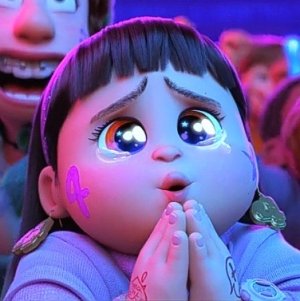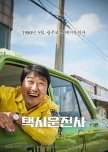Wow. Just wow. I went to watch A Taxi Driver blind. All I knew was Sang Kang Ho and Ryu Jun Yeol are in it. And it's based on real events. But that's it. I don't know anything about the Gwanju Uprisings nor Jürgen Hinzpeter, the German journalist which Peter is based on. But I left the theatre in tears and in awe.
A Taxi Driver is an incredibly moving, inspiring and brave film. It's a film that honours the bravery of ordinary people, the unsung heroes that battle in the face of fascism and brutality. Taxi drivers, students, journalists—coming together to do one thing: tell the world.
As a journalism student, I have a romanticized view of the type of journalist I want to be—journalists like Peter. Those who risk their life to tell stories that are undiscovered and that are censored. That's the type of journalist I aspire to be. If that's what I'm going to end up becoming is another story. Perhaps that's one reason why the film shook me to my core. Given the political situation in Hong Kong as well and the tension between press freedom and self-censorship here, I feel that, as an aspiring journalist, I have the duty to tell the world things like this—just like Peter, just like Mr. Hinzpeter. And just like Mr. Kim (Sang Kang Ho), who feels that he has the responsibility to his taxi customer—and eventually, to his people.
This is an inspiring film given that to some, especially in a capitalist society (where I'm living), taxi drivers are not seen as honourable jobs. Even today, the reputation of journalists is diminishing. Yet, we have Mr. Kim, a widower who makes-end-meet to provide and care for his 11-year-old daughter as a taxi driver. And despite having to leave his daughter behind and in the face of danger and even death, he owned up to his responsibility.
I will take you to the airport no matter what.
A father that his daughter will forever be proud of.
Perhaps, if you too, see the horror and the brutality that he's seen in Gwangju, you would feel that you have the responsibility to tell the world about it—for a better future for your daughter and future generations. The characters are unsung heroes who are selfless and go through lengths to get the world out there. Jae-sik, a university student (Ryu Jun Yeol) and the taxi drivers.
I have seen many films with Sang Kang Ho in it but to me, this is one of the, if not the best performances of his to date. Sang, a veteran film actor proves his versatility combining comedy and drama and switching between the two with flawless execution. He is the heart of this film. But the soul is the bond, despite short, of the two men: Mr. Kim and Peter. In real life, Hinzpeter tried to search for the real Mr. Kim up until his death in 2016...with no luck. Mr. Kim's son said that his father passed away from cancer four years after the uprising. This film, is a tribute that's too late for the two. And for the other people who helped the two get the word of the Uprising.
Jang Hoon (who worked as an assistant director to Kim Ki Duk) and cinematographer, Go Nak-seon have done a profound job in the film's visuals. The details are apparent and particularly the chase scene between the disguised police and Kim and Peter looks like a sequence out of a dystopian film—a very good parallel to the horror of the fate of the protestors. Its combination of black/red and smoke just produces this eeriness and oozes an apocalyptic mood. That said, the taxi driver vs. military chase scene to me, is an amazing "action" sequence. Not only because of the way it was delivered visually but also emotionally.
Jang and Go makes use of saturated tones to achieve the vintage effect. With occasional slow-motions and close-up particularly during its dramatic sequences (blood flowing out, people getting shot) may perhaps be too sappy for some but it allows not only for drama but also for portraying the horror and a sense of hopelessness. Combine that with hospital scenes and injured protestors of bodies of the deceased—it overwhelms you but it tells you: this is wrong. And that is why we need to tell the world about it.
While A Taxi Driver may be different things like a tribute to the unsung heroes, it also taps on the dangerous roles of foreign correspondents and their local contacts particularly when it comes to war reporting. But this responsibility that we have to tell the world is carried in their heart.
Combining comedy with action is evident in its indoor scene as the characters laugh and cheer only to be swept away by the sound of bombs—looks trying to live normally while caught in the terror of war.
A Taxi Driver is powerful. It is brave. And it is inspiring. Perhaps no words are enough to say how I applaud these people (especially their real life counterparts) on their bravery. No, you don't have to wear a cape to be a hero. You could hold a camera. And you could drive a taxi.
Yup, I definitely cried bucket of tears for this one.
A Taxi Driver is an incredibly moving, inspiring and brave film. It's a film that honours the bravery of ordinary people, the unsung heroes that battle in the face of fascism and brutality. Taxi drivers, students, journalists—coming together to do one thing: tell the world.
As a journalism student, I have a romanticized view of the type of journalist I want to be—journalists like Peter. Those who risk their life to tell stories that are undiscovered and that are censored. That's the type of journalist I aspire to be. If that's what I'm going to end up becoming is another story. Perhaps that's one reason why the film shook me to my core. Given the political situation in Hong Kong as well and the tension between press freedom and self-censorship here, I feel that, as an aspiring journalist, I have the duty to tell the world things like this—just like Peter, just like Mr. Hinzpeter. And just like Mr. Kim (Sang Kang Ho), who feels that he has the responsibility to his taxi customer—and eventually, to his people.
This is an inspiring film given that to some, especially in a capitalist society (where I'm living), taxi drivers are not seen as honourable jobs. Even today, the reputation of journalists is diminishing. Yet, we have Mr. Kim, a widower who makes-end-meet to provide and care for his 11-year-old daughter as a taxi driver. And despite having to leave his daughter behind and in the face of danger and even death, he owned up to his responsibility.
I will take you to the airport no matter what.
A father that his daughter will forever be proud of.
Perhaps, if you too, see the horror and the brutality that he's seen in Gwangju, you would feel that you have the responsibility to tell the world about it—for a better future for your daughter and future generations. The characters are unsung heroes who are selfless and go through lengths to get the world out there. Jae-sik, a university student (Ryu Jun Yeol) and the taxi drivers.
I have seen many films with Sang Kang Ho in it but to me, this is one of the, if not the best performances of his to date. Sang, a veteran film actor proves his versatility combining comedy and drama and switching between the two with flawless execution. He is the heart of this film. But the soul is the bond, despite short, of the two men: Mr. Kim and Peter. In real life, Hinzpeter tried to search for the real Mr. Kim up until his death in 2016...with no luck. Mr. Kim's son said that his father passed away from cancer four years after the uprising. This film, is a tribute that's too late for the two. And for the other people who helped the two get the word of the Uprising.
Jang Hoon (who worked as an assistant director to Kim Ki Duk) and cinematographer, Go Nak-seon have done a profound job in the film's visuals. The details are apparent and particularly the chase scene between the disguised police and Kim and Peter looks like a sequence out of a dystopian film—a very good parallel to the horror of the fate of the protestors. Its combination of black/red and smoke just produces this eeriness and oozes an apocalyptic mood. That said, the taxi driver vs. military chase scene to me, is an amazing "action" sequence. Not only because of the way it was delivered visually but also emotionally.
Jang and Go makes use of saturated tones to achieve the vintage effect. With occasional slow-motions and close-up particularly during its dramatic sequences (blood flowing out, people getting shot) may perhaps be too sappy for some but it allows not only for drama but also for portraying the horror and a sense of hopelessness. Combine that with hospital scenes and injured protestors of bodies of the deceased—it overwhelms you but it tells you: this is wrong. And that is why we need to tell the world about it.
While A Taxi Driver may be different things like a tribute to the unsung heroes, it also taps on the dangerous roles of foreign correspondents and their local contacts particularly when it comes to war reporting. But this responsibility that we have to tell the world is carried in their heart.
Combining comedy with action is evident in its indoor scene as the characters laugh and cheer only to be swept away by the sound of bombs—looks trying to live normally while caught in the terror of war.
A Taxi Driver is powerful. It is brave. And it is inspiring. Perhaps no words are enough to say how I applaud these people (especially their real life counterparts) on their bravery. No, you don't have to wear a cape to be a hero. You could hold a camera. And you could drive a taxi.
Yup, I definitely cried bucket of tears for this one.
Was this review helpful to you?


























